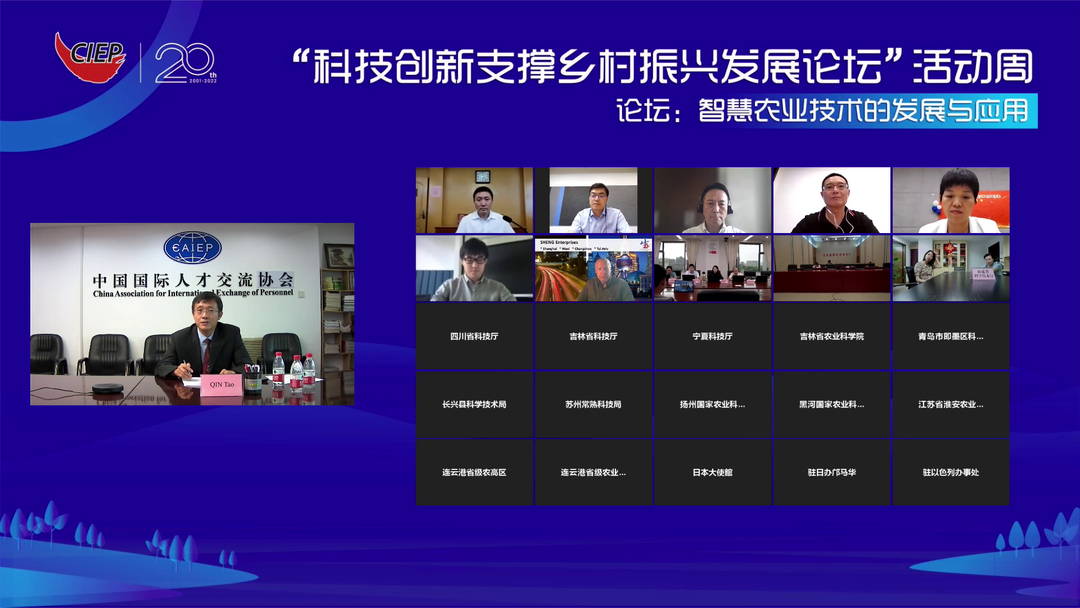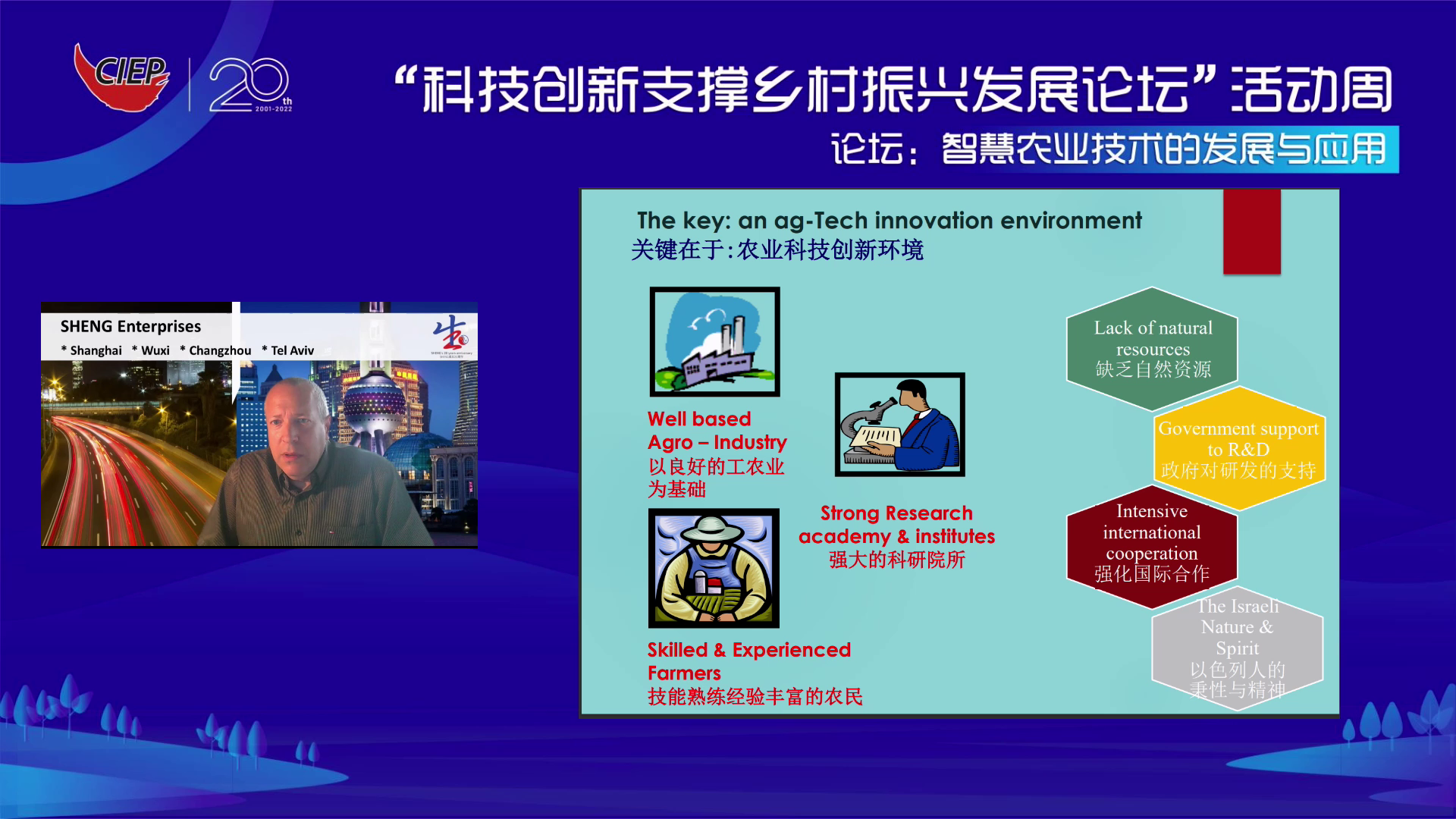During the Week of “Forum on Scientific and Technological Innovation Underpinning Rural Revitalization” of the 20th Conference on International Exchange of Professionals hosted by China Association for International Exchange of Personnel and jointly organized by Shenzhen Center for International Exchange of Personnel and Omron (China) Co., Ltd., the Second Forum themed on the “Development and Application of Smart Agriculture Technology” was held online on June 23, 2022.
Sun Chuanfan, Deputy Director-General of the Department of Science and Technology for Rural Development, Ministry of Science and Technology of the People’s Republic of China; Piter de Jong, Director of the Development Aid Agency, the Ministry of Economic Affairs (Netherlands), and Winner of Shanghai “Magnolia Gold Award”; Ilan Maor, former Consul General of Israel in Shanghai and President of IsCham China; Tao Wei, President of UML-TECH; Naoshi Ozawa, Global President, Smart Agriculture Undertaking Promotion Center of Omron (China) Co., Ltd.; Wang Xiao, Vice President of XAG; Ren Shuiying, Chairman of Zodolabs Biotech; He Xiaogang, Head of China Region, Bayer Digital Incubator, Bayer (China) Limited, and other Chinese and foreign experts attended the Forum and delivered speeches online. The Forum was presided over by Qin Tao, Deputy Director of China Association for International Exchange of Personnel. In addition, guests from the competent departments for science and technology in all provinces/autonomous regions/municipalities directly under the central government/cities specifically designated in the state plan/sub-provincial cities and Xinjiang Production and Construction Corps, as well as those from some agricultural colleges and universities, scientific research institutes, agricultural high-tech industry demonstration zones, national innovative counties (cities) and agricultural enterprises in China also participated in the Forum online.

Sun Chuanfan said that the Ministry of Science and Technology had always attached great importance to the scientific and technological innovation in the smart agriculture, driving the development of the smart agriculture and promoting constant improvement in the agricultural quality and efficiency by making arrangements to tackle problems in key and core technologies in relevant fields through the National Key R&D Program of China and striving to advance the integrated allocation of projects, bases, talents and funds. During the 14th Five-Year Plan period, the Ministry of Science and Technology would push forward tackling problems in key and core technologies, striving to build national strategic scientific and technological strength in the smart agriculture, further promoting the cooperation and exchange of smart agriculture, and facilitating the smart agriculture moving a fresh step ahead for development.
Piter de Jong said that this year marked the 50th anniversary of the establishment of diplomatic relations between the Netherlands and China. For the past 5 decades, the two countries had enjoyed fruitful cooperation in various fields. In the field of agriculture, there was steadily growing cooperation between China and the Netherlands, with bilateral investment constantly expanding, which not only promoted the agricultural modernization of China, but also expanded the market further for enterprises from the Netherlands. It was expected that China and the Netherlands would go into more partnership, exploring more opportunities for cooperation and delivering more fruitful results.
Tao Wei introduced the development of global smart agriculture from stand-alone intelligence to systematic intelligence, as well as the progress made by UML-TECH in the application of intelligent agricultural machinery and smart agriculture, and said that there was great room for improvement in today’s smart agriculture of China being in a period of historic opportunity for development. Moreover, the national guidelines and guiding policies regarding digital agriculture and intelligent agricultural machinery introduced during the 14th Five-Year Plan period would give fresh impetus to this industry for its development.
Naoshi Ozawa introduced the challenges the smart agriculture as a significant solution to sustainable agricultural development faced, as well as the progress made by Omron in the application of sensor and AI to the digital transformation of agricultural production management, and said that Omron was willing to work with the government and the industry to promote the digital transformation of agricultural production and make a positive contribution to the agricultural and rural development.
Wang Xiao introduced the progress made by XAG in the 3 main fields, namely the digital agricultural infrastructure construction, the intelligent precision agricultural technology and equipment R&D, design and manufacturing, and the digital smart agriculture operating system development, as well as the advantages and features of the agricultural drones, agricultural unmanned vehicles, agricultural machinery autopilots, remote sensing with unmanned aerial vehicles, Internet of agriculture (IOA), and PasS and SasS in agriculture based on database and agricultural AI, and said that XAG was willing to offer a holistic service-oriented solution to the agricultural and rural development before, during and after agricultural production.
Ren Shuiying said that the quality safety of agricultural products was the foundation of high-quality development of agriculture, and process control was the foundation of consolidating the quality safety of agricultural products. The quality of agricultural products was improved mainly by promoting high-quality production engineering systems and pushing forward standardized production; strictly implementing the quality certification system for edible agricultural products and further improving the quality traceability system; and speeding up the combination of rapid inspection and legal inspection, and improving the inspection efficiency. These were the very things based on which Zodolabs Biotech was conducting business, with the purpose of serving governments, enterprises and consumers by strengthening the agricultural development through quality enhancement and brand building.
He Xiaogang said that China was characterized by diversification in its climate, distribution of natural resources, and agricultural production activities, and Bayer had always insisted on in-depth cooperation with business partners in the fields of software, hardware, circulation, etc. to push forward the modernization of agricultural development of China by customizing solutions. In the future, Bayer would strengthen cooperation with China in terms of application of AI to seed-breeding, digitalization of agricultural production process, facility agriculture, etc. to promote the leapfrog development of this industry.
Ilan Maor shared experiences in Israel developing into a global leading agricultural technology center by developing advanced agricultural technology to make up for deficiency in its natural resources, introducing a number of high-grade, precision and advanced agricultural science and technology enterprises in Israel with their own distinctive features in the fields of soil, water, drip irrigation and fertilization planting, smart agriculture, animal husbandry, food processing, etc., and said that these enterprises were very willing to establish cooperation with China so as to meet the demands of the Chinese market with their own technology.

After the speeches, relevant participants had interaction and exchanges with the guests.
The Conference on International Exchange of Professionals (CIEP) is now a national, internationalized and comprehensive exhibition and negotiation occasion for the exchange of international technological innovation talents. As an integral part of the CIEP, the “Forum on Scientific and Technological Innovation Underpinning Rural Revitalization” driven by demands aimed to provide opportunities for international cooperation in scientific and technological innovation and talent exchange in agriculture and rural areas and build a platform for serving rural revitalization in a practical way by making the most of its scientific and technological innovation and expert resources and sharing ideas and experiences in the agricultural and rural development.

